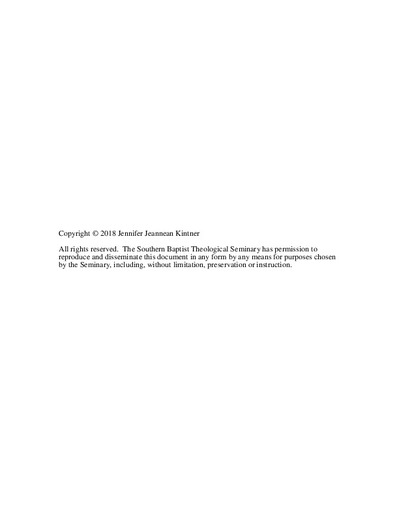Assessing Epistemological Development among Women in Evangelical Seminaries
Subject
Women seminariansKnowledge, Theory of--Religious aspects--Christianity
Perry, William G., Jr., 1913-1998
Abstract
Building on the foundation laid by John David Trentham and his colleagues in researching the epistemological development among pre-ministry students, this phenomenological study used the Perry scheme as a lens to examine development among women in evangelical seminaries. Understanding female seminarians’ patterns and perspectives on knowing, along with the contextual realities they experience in seminary, aids women who desire to go to seminary, women in seminary, seminary administration, professors, and student development personnel, as well as churches in their ministry to women.
The literature review in this work covers the theological foundation for epistemology. Theologically, knowledge is seen to be dependent, unified, relational, requiring belief, and necessitating obedience. From this foundation, Perry’s research and nine-stage scheme is explored. As this study focuses on the epistemological development of women, the following studies related to gender are also explored: Women’s Ways of Knowing by Belenky et al., Knowing and Reasoning in College by Baxter Magolda, and In a Different Voice by Carol Gilligan. Themes between these works were identified as voice, relationship, and connectedness. The Reflective Judgment Model by King and Kitchener is also examined and compared with Perry’s scheme. The use of the Reflective Judgment Model to study the development of seminary students is also reported. The ongoing dialogue of research on pre-ministry students is then surveyed including a discussion of inverse consistency and Trentham’s taxonomy of epistemological priorities and competencies.
Thirty women were interviewed using semi-structured protocols to explore their epistemological development in their institutional contexts. This study included denominational and inter/multidenominational contexts. Participants were enlisted by completing a Thesis Study Participation Form. Using a custom-designed interview protocol for this population, an interview was conducted with each participant. The interviews were then transcribed and submitted to the CSID for scoring. The transcripts were also examined for statements demonstrating each of the epistemological priorities or competencies in Trentham’s Taxonomy. Statement attributions were determined in conjunction with Trentham. An independent content analysis was also completed to examine themes and trends. The data was then analyzed and findings reported.
KEYWORDS: anthropotelic, Baxter Magolda, Belenky et al., biblical epistemology, Carol Gilligan, Center for the Study of Intellectual Development (CSID), Christian formation, Christotelic, complementarian, critical thinking, denominational, dualism, ethical development, epistemological development, epistemological telos, female patterns and perspectives, faith and reason, higher education, institutional context, institutional type, intellectual development, interdenominational, inverse consistency, multidenominational, multiplicity, Perry Scheme, pre-ministry, Reflective Judgment Model, seminary, seminary student development, student affairs, student development, student life, telos, theological foundation for epistemology, Trentham’s taxonomy of epistemological priorities and competencies, vocational ministry, William Moore, William Perry, women in ministry, women in seminary, Women’s Ways of Knowing (WWK)

